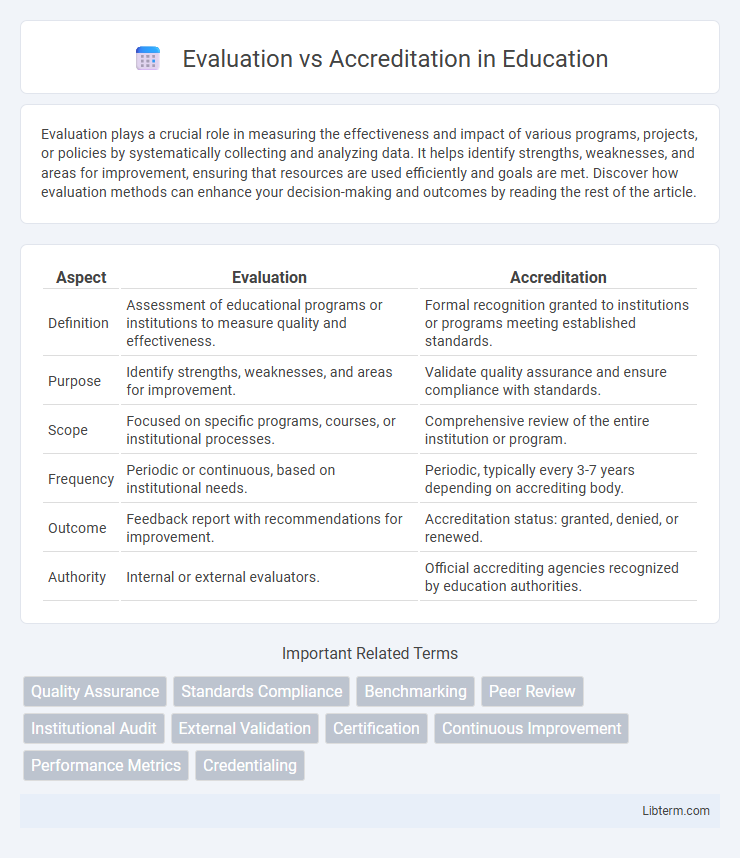Evaluation plays a crucial role in measuring the effectiveness and impact of various programs, projects, or policies by systematically collecting and analyzing data. It helps identify strengths, weaknesses, and areas for improvement, ensuring that resources are used efficiently and goals are met. Discover how evaluation methods can enhance your decision-making and outcomes by reading the rest of the article.
Table of Comparison
| Aspect | Evaluation | Accreditation |
|---|---|---|
| Definition | Assessment of educational programs or institutions to measure quality and effectiveness. | Formal recognition granted to institutions or programs meeting established standards. |
| Purpose | Identify strengths, weaknesses, and areas for improvement. | Validate quality assurance and ensure compliance with standards. |
| Scope | Focused on specific programs, courses, or institutional processes. | Comprehensive review of the entire institution or program. |
| Frequency | Periodic or continuous, based on institutional needs. | Periodic, typically every 3-7 years depending on accrediting body. |
| Outcome | Feedback report with recommendations for improvement. | Accreditation status: granted, denied, or renewed. |
| Authority | Internal or external evaluators. | Official accrediting agencies recognized by education authorities. |
Introduction to Evaluation and Accreditation
Evaluation is the systematic process of assessing an institution's programs, services, or performance based on predefined criteria to ensure quality and effectiveness. Accreditation is a formal recognition granted by an authorized accrediting body indicating that an institution meets established standards of quality and credibility. Both processes are crucial in maintaining educational excellence, with evaluation serving as the basis for accreditation decisions.
Defining Evaluation in Education and Institutions
Evaluation in education and institutions refers to a systematic process of assessing the effectiveness, quality, and outcomes of programs, teaching methods, or organizational functions. It involves collecting and analyzing data to determine whether goals and standards are being met, guiding decision-making for improvements. Unlike accreditation, which is a formal recognition granted by external bodies, evaluation is an ongoing internal or external review focused on performance measurement and development.
Understanding Accreditation: Purpose and Process
Accreditation is a formal process conducted by recognized agencies to ensure institutions meet established standards of quality and performance in education. The purpose of accreditation is to provide external validation of a program's or institution's commitment to continuous improvement, student learning outcomes, and resource adequacy. The process involves comprehensive self-assessment, peer review, site visits, and ongoing monitoring to maintain accountability and enhance institutional credibility.
Key Differences Between Evaluation and Accreditation
Evaluation involves systematically assessing an institution's or program's quality based on predefined criteria, providing feedback for improvement, while accreditation is a formal recognition granted by an authoritative body confirming that the institution meets established standards. Evaluation is often an internal or external review process that identifies strengths and weaknesses, whereas accreditation serves as an official endorsement that ensures compliance with regulatory or industry requirements. Key differences include the purpose, scope, and outcome: evaluation aims to enhance quality through analysis, whereas accreditation certifies institutional credibility and compliance.
Benefits of Evaluation for Continuous Improvement
Evaluation offers critical insights into institutional performance, identifying strengths and areas for growth that drive continuous improvement. By systematically assessing processes, outcomes, and stakeholder feedback, evaluation promotes data-driven decision-making that enhances educational quality and operational efficiency. This ongoing cycle of assessment empowers organizations to adapt strategies, foster innovation, and achieve sustained excellence beyond the requirements of formal accreditation.
The Importance of Accreditation for Credibility
Accreditation serves as a formal recognition that an institution or program meets established standards of quality and credibility, enhancing its reputation among stakeholders. Unlike evaluation, which is often an internal or situational assessment process, accreditation provides an authoritative validation from an external body, signaling trustworthiness and adherence to industry benchmarks. This external validation is crucial for attracting students, securing funding, and fostering partnerships, as it assures consistent educational quality and institutional reliability.
Common Criteria Used in Evaluation and Accreditation
Evaluation and accreditation both rely on established criteria to ensure quality and standards, though their focus differs; evaluation typically assesses specific processes or outcomes using criteria such as relevance, effectiveness, efficiency, and sustainability, while accreditation emphasizes adherence to predetermined standards related to institutional quality, governance, academic programs, and student services. Common evaluation criteria include input, process, output, and impact indicators, providing a comprehensive analysis of performance. Accreditation criteria often encompass institutional mission alignment, faculty qualifications, resource adequacy, curriculum design, and continuous improvement mechanisms to guarantee long-term educational excellence.
Challenges in Implementing Evaluation and Accreditation
Challenges in implementing evaluation and accreditation include aligning diverse institutional goals with standardized criteria, which often leads to resistance from stakeholders. Limited resources and inadequate training hinder the consistent application of evaluation frameworks and accreditation standards across organizations. Furthermore, maintaining objectivity while accommodating contextual differences presents significant difficulties in achieving fair and meaningful assessments.
Global Standards and Practices in Accreditation
Evaluation involves systematically assessing a program or institution against predefined criteria, while accreditation formally recognizes that these entities meet established quality standards. Global standards in accreditation, such as those set by the International Network for Quality Assurance Agencies in Higher Education (INQAAHE) and the Council for Higher Education Accreditation (CHEA), ensure consistency in quality assurance practices across borders. These frameworks emphasize transparency, continuous improvement, and stakeholder engagement to uphold international credibility and comparability.
Choosing the Right Approach: Evaluation or Accreditation?
Choosing between evaluation and accreditation depends on organizational goals and compliance requirements; evaluation offers a flexible, formative assessment focused on improvement, while accreditation provides a formal, standardized validation of quality by an authoritative body. Organizations seeking continuous enhancement may prefer evaluation for its adaptability and feedback mechanisms, whereas those needing external recognition and credibility often opt for accreditation. Understanding sector-specific standards, resource availability, and long-term objectives is crucial for selecting the appropriate approach.
Evaluation Infographic

 libterm.com
libterm.com